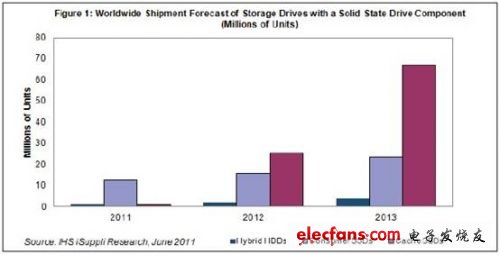Electronic enthusiast network [Compile / Triquinne]: This article mainly describes the cache SSD is a super mainstream storage solution compared to hybrid HDD. Here Xiaobian introduces you to a few basic concepts in the following.
HDD, the abbreviation of Hard Disk Drive, the English name of the hard disk drive. The most basic computer memory, computer hard disk C disk, D disk for disk partitions in our computer are all hard disk drives.
SDD, solid state disk, which is a hard disk made of a solid state electronic memory chip array, consists of a control unit and a memory unit (DRAM or FLASH chip). It has the advantages of high speed, durable shockproof, no noise and light weight. Widely used in military, automotive, industrial control, video surveillance, network monitoring, network terminals, power, medical, aviation, navigation equipment and other fields.
According to IHS iSuppli's storage industry market brief, for the increasingly popular Ultrabook, a hybrid hard disk (HDD) with a built-in NAND flash layer may have the advantage of integrated storage, but the cache solid state drive (SSD) relies on it. Flexibility will remain the mainstream storage solution for Superbooks.
Cache SSD is already the main storage form of Superbook. This year's shipments will increase from 864,000 last year to 25.4 million, a surge of 2800%, as shown in Figure 1. Shipments will rise to 67.2 million next year, and will exceed 100 million in 2015, reaching 131.7 million by 2016.

In comparison, shipments of hybrid HDD drives will increase from 1 million last year to 2 million, and by 2016 it is expected to reach 25 million. The third form of flash storage, a dedicated SSD without cache components, will ship 15.7 million in consumer applications this year and gradually increase to 61.7 million by 2016.
The hybrid HDD consists of a traditional hard disk and an integrated NAND flash layer, both in a separate package. Hybrid HDD is a new option that is being considered by the ultra-thin Ultrabook. Seagate's hybrid product, the Momentus XT, contains up to 8GB of single-layer NAND and 750GB of two 2.5-inch discs. Seagate's rival Western Digital and Toshiba are also considering launching their own hybrid HDD, which will include 8GB or larger NAND cache.
Unlike hybrid HDDs, cached SSDs act as a separate, separate storage unit that works with hard drives and is not in the same package. For example, Acer's Aspire S3 Ultrabook carries a 20GB SSD with a 320GB hard drive next to it. The cache SSD solution was first discovered by PC vendors because the use of dedicated SSDs is too expensive to be accepted by consumers in the retail market. However, if a physical hard disk is combined with a smaller cache component, the PC manufacturer can both increase the response speed and expand the storage capacity while also controlling the cost.
Cache SSDs also have more advantages than integrated hybrid HDDs. For example, because of the choice of multiple hard disk manufacturers, discrete cache SSDs and hard drives are more scalable and efficient for mainstream storage. At the same time, since SSDs and HDDs have recently focused on a more portable footprint, cached SSDs and thin HDDs do not require any changes to maintain the cost-effectiveness of their manufacturing processes.
In addition, cached SSDs are expected to evolve into the form of switchable mSATA, which will not only help to reduce the convenience of today's hybrid HDDs, but also provide scalability similar to DRAM modules or USB. There is now a 2.5-inch 500GB hard drive with a thickness of 7mm. The next step will be a 5mm thick hard drive, while the hybrid HDD will still be 9mm thick. SATA SSDs are also getting thinner, and NAND on the motherboard has become more feasible.
These benefits highlight the advantages of cached SSDs over hybrid HDDs, which typically require some discount in performance for high volume adoption. Hybrid HDDs have cost issues, long design cycles, and strict design tolerances, adding to the difficulty of using them for superbooks.
Therefore, when the cached SSD overcomes those shortcomings, the hybrid HDD's advantages over the integration form will actually become its weakness in the next few years.
This article was compiled by the Electronic Enthusiasts Network. If you want to know more about this topic, please continue to pay attention to the electronic enthusiast network! More exciting waiting for you...
Nantong Boxin Electronic Technology Co., Ltd. , https://www.bosencontrols.com